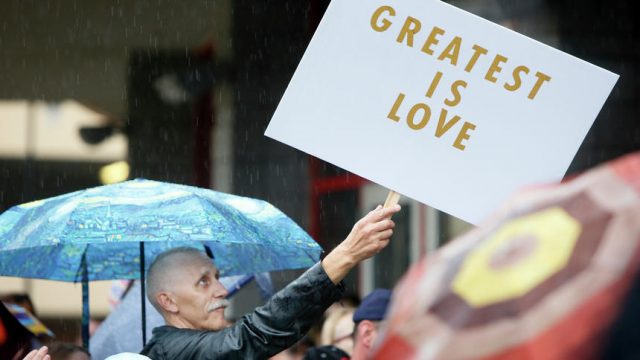A.J. Schultz: Address Hate by Empowering Judges and Removing Politics

Clinton Lende of Fargo holds a sign during an anti-hate rally Wednesday, Aug. 2, 2017, in front of the Civic Center, Fargo. Michael Vosburg / Forum Photo Editor
Everyone is aware of the incident involving those women in that Fargo Walmart parking lot, and the debate we now have about hate crimes legislation. It’s been a long time coming: North Dakota ranks second-highest in hate crimes per capita, and has ranked no lower than second since 2011.
The point of any criminal law is to codify a standard of conduct, not a status. For instance, the act of possessing or ingesting illegal drugs is a crime, but being “a drug user” is not. So, the question is, should already-illegal conduct be singled out because the conduct was committed with hateful motivations?
The reality is that motivations do matter. Crime prevention means addressing the causes of crime, and tackling the motivations behind negative acts can reduce or eliminate those acts. We’ve already seen that in action, as Fargo Police Chief David Todd held a meeting to resolve the issues between those women from that Walmart parking lot. But actual punishment for conduct can only come through the Judiciary.
[mks_pullquote align=”right” width=”300″ size=”24″ bg_color=”#ffffff” txt_color=”#000000″]The problem with hate crimes legislation is that legislators are politicians who have to get elected. The issue, already sensitive because of free-speech implications, is seriously open to politicization.[/mks_pullquote]
The problem with hate crimes legislation is that legislators are politicians who have to get elected. The issue, already sensitive because of free-speech implications, is seriously open to politicization. I’m sure you’ve heard the talking points, for both sides.
Fortunately, we have an impartial Judiciary. In criminal cases, judges are required to consider a number of factors in sentencing. These include things like the likelihood to respond to probation, whether the person had an excuse or justification that didn’t rise to the level of a defense, what kind of criminal history or background each person has, and more. As a result of these factors, criminal judgments can be individualized to address the needs and punishments of each offender, to correct and rehabilitate.
If we agree that hate crimes must be prevented and punished, and we want to keep politics out of the punishment process, we should empower our judges. Our judges weigh cases without partisan political interferences.
The Legislature can resolve this issue without political commentary, and simply add a sentencing factor for judges to consider in criminal cases: “Whether the commission of the offense was motivated because of the victim’s membership in a protected class under law.”
This approach keeps politics out of the equation and uses the tools we already have to address a serious problem. It also allows each case to be tailored to the circumstances. Each district’s presiding judge would report those cases to the Attorney General’s Office every six months, for feedback to integrate the results into the prevention of these offenses.
Hate has no place in North Dakota. If we can do something about it, we should. And if we can do it while keeping politics out of our justice system, we must.




